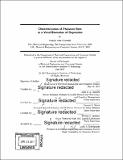Characterization of phoneme rate as a vocal biomarker of depression
Author(s)
Ciccarelli, Gregory Alan
Download1004957568-MIT.pdf (18.30Mb)
Other Contributors
Massachusetts Institute of Technology. Department of Electrical Engineering and Computer Science.
Advisor
John D. E. Gabrieli, Satrajit S. Ghosh and Thomas F. Quatieri.
Terms of use
Metadata
Show full item recordAbstract
Quantitative approaches to psychiatric assessment beyond the qualitative descriptors in the Diagnostic and Statistical Manual of Mental Disorders could transform mental health care. However, objective neurocognitive state estimation and tracking demands robust, scalable indicators of a disorder. A person's speech is a rich source of neurocognitive information because speech production is a complex sensorimotor task that draws upon many cortical and subcortical regions. Furthermore, the ease of collection makes speech a practical, scalable candidate for assessment of mental health. One aspect of speech production that has shown sensitivity to neuropsychological disorders is phoneme rate, the rate at which individual consonants and vowels are spoken. Our aim in this thesis is to characterize phoneme rate as an indicator of depression and to improve our use of phoneme rate as a feature through both brain imaging and neurocomputational modeling. This thesis proposes that psychiatric assessment can be enhanced using a neurocomputational model of speech motor control to estimate unobserved parameters as latent descriptors of a disorder. We use depression as our model disorder and focus on motor control of speech phoneme rate. First, we investigate the neural basis for phoneme rate modulation in healthy subjects uttering emotional sentences and in depression using functional magnetic resonance imaging. Then, we develop a computational model of phoneme rate to estimate subject-specific parameters that correlate with individual phoneme rate. Finally, we apply these and other features derived from speech to distinguish depressed from healthy control subjects.
Description
Thesis: Ph. D., Massachusetts Institute of Technology, Department of Electrical Engineering and Computer Science, 2017. Cataloged from PDF version of thesis. Includes bibliographical references (pages 149-161).
Date issued
2017Department
Massachusetts Institute of Technology. Department of Electrical Engineering and Computer SciencePublisher
Massachusetts Institute of Technology
Keywords
Electrical Engineering and Computer Science.